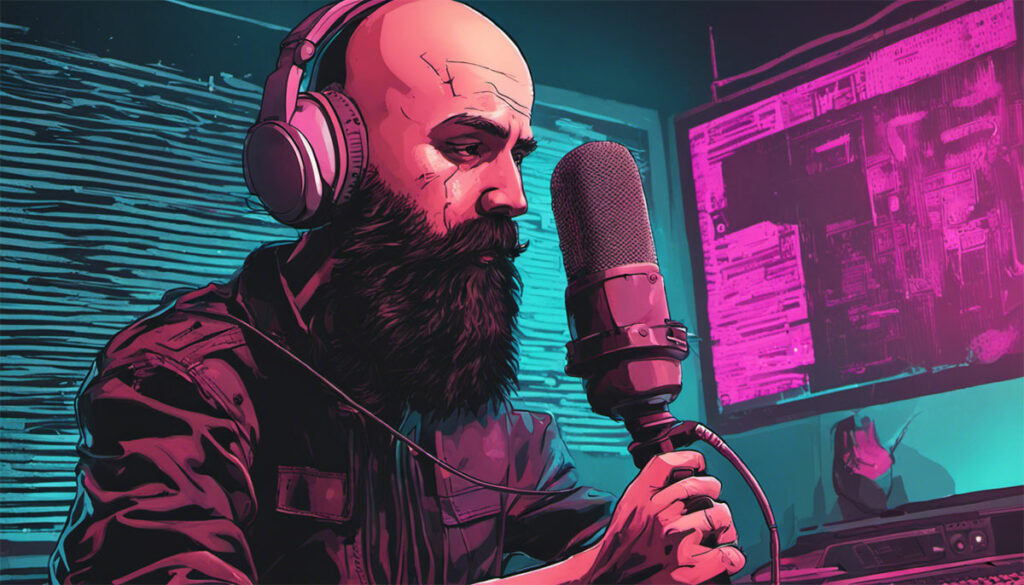I was listening to The Rich Roll Podcast the other day. His guest was comedian and fellow podcaster Pete Holmes. Midway through their conversation, they hit on something close to home for me: why I host conversational podcasts, and why I do it the way that I do.
I’m an introverted, neurodivergent creator in a loud, technologically hyper-connected world. I want human connection, but have struggled my entire life with how to make that happen in a meaningful, appropriate way.
Small talk is a killer for me. I don’t get it. I don’t want it. I want to jump right into thoughtful, self-reflective, curiosity-driven, deep conversations. But I can’t approach a stranger on a street corner and expect us to talk about their divorce, their queer experience, their abusive childhood, their addictions, their thoughts on spirituality, their creativity, dreams and … well, anything other than, maybe, the weather. Maybe.
And that’s only if we both put away our phones, take the earbuds from our ears, make eye contact (actually, that’s an uncomfortable one for me and takes intentional effort) and let down our drawbridges for a few moments of real, human opportunity together.
So I use podcasting as an excuse, a tool, an entry. People say yes to a podcast. I can tell a stranger I’m interested in their story and, because of the podcast, they’ll sit down for an hour or two and pour out their deep thoughts and emotions. Yet we’re the same two strangers that, if standing on a street corner, might not even nod hello to each other. The podcast is my way into connection with others, and on terms that work for me and others.
Like Rich Roll and Pete Holmes talk about in the transcripted snippet of their conversation below, I do that through being vulnerable along with the podcast guests. So much so, that I often leave a podcast conversation feeling a vulnerability hangover, as Brené Brown calls it. Sometimes I second-guess my level of sharing. But I keep going, because I think it’s essential. For all of us.

From The Rich Roll Podcast (Oct. 19, 2023):
Rich Roll: It’s fun to have fancy people on, but sometimes they’re a lot harder to interview, because they’re so media savvy. They do so many interviews. You have to find a different way in.
Pete Holmes: In my experience, that’s the old [Marc] Maron trick, I learned it from Maron. You have to tell them a story of shame–
Rich Roll: You have to lead with vulnerability. Hundred percent.
Pete Holmes: You have to. It’s the oldest podcast– I don’t want to say it’s a trick. It’s a trick in the sense that it’s a trick towards deep, rich, in-this-moment, fuck-the-show, just two human beings–
Rich Roll: You can’t expect somebody to be honest and open if you’re not willing to do that yourself. So it’s not a trick. We’re setting the stage, “this is where I’m coming from–”
Pete Holmes: When people do it to me, I love it. I’ve said this before, but podcasts are just an excuse, like this, for you and me to sit on a porch and have a sarsaparilla. You know what I mean? … We’re really just doing what people have always done. We’re on a wagon ride across the Dakotas and we finally get to talk. There used to be more time for that, but it’s a human need.
Rich Roll: If I were to drive up to Ojai, this is the conversation that I would have with you. But because our lives are the way that they are, that’s an unlikely occurrence. So I have to create all this artifice in order to have this conversation.
I enjoy many facets of podcasting, but it’s all with the excuse to get to talk with someone whose story I’m curious to know and connect with. I like being a connector, at heart. Not only with the podcast guests, but between the guests and listeners. It’s an opportunity for me to let my guard down and open up, too. Again, essential.
I visualize vulnerability as raising a flag or shooting a flare into the sky, signaling, “Here I am. Come join me. Let’s connect.” When I’m vulnerable with guests, it creates a safe space for them to slide out on the limb with me. I’m not an interviewer who is standing at a distance, expecting the other person to do all the lifting, to bare their souls in a vacuum. We’re in it together. All of us.
Why I host conversational podcasts is for the human connection. How I do it is by leading with my own humanness. It’s a scary leap every time. I don’t think there’s any other way to do it. Podcast or otherwise.
Image created by Adam Williams, using the DreamStudio AI generator


